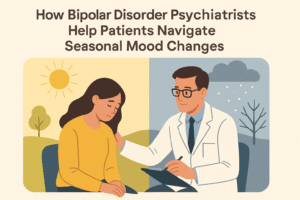
Seasonal changes can affect anyone’s mood, but for individuals living with bipolar disorder, the shift from long, sunny days to darker, colder months can feel like an emotional rollercoaster. Managing these fluctuations isn’t just about coping with the weather; it’s about understanding how environmental factors interact with the brain’s chemistry.
This is where the expertise of a Bipolar Disorder Psychiatrist becomes invaluable. These specialists help patients identify patterns, manage symptoms, and create personalized treatment strategies to maintain emotional balance throughout the year.
Understanding Bipolar Disorder and Seasonal Patterns
Bipolar disorder is a mental health condition marked by alternating periods of mania (high energy, euphoria, or irritability) and depression (low mood, fatigue, or hopelessness). For many, these mood swings can follow a seasonal pattern, a phenomenon known as seasonal bipolar disorder.
- Spring and Summer: Some people experience increased energy, impulsivity, and reduced sleep, signs of manic or hypomanic episodes.
- Fall and Winter: Others face sluggishness, sadness, and a loss of motivation, signaling depressive episodes.
Research suggests that these patterns are influenced by changes in daylight exposure, circadian rhythm, and neurotransmitter activity, all of which are tightly linked to mood regulation.
Why Seasonal Changes Affect People with Bipolar Disorder
1. Disruption in Circadian Rhythms
Our internal body clock circadian rhythm regulates sleep, hormone production, and mood. Shorter days in winter and longer days in summer can throw this rhythm off balance. For individuals with bipolar disorder, these disruptions may trigger or worsen mood episodes.
2. Altered Melatonin and Serotonin Levels
Light exposure influences the production of melatonin (the sleep hormone) and serotonin (the happiness neurotransmitter). Reduced daylight in winter may lower serotonin, contributing to depressive symptoms, while longer daylight in summer can overstimulate mood and energy.
3. Lifestyle and Environmental Shifts
Colder weather, less physical activity, and reduced social interaction in winter months can worsen depression. Conversely, high activity and overcommitment during summer can increase the risk of mania.
A Bipolar Disorder Psychiatrist understands these biological and environmental influences and works to align treatment strategies with the patient’s seasonal vulnerabilities.
The Role of a Bipolar Disorder Psychiatrist in Managing Seasonal Mood Changes
A Bipolar Disorder Psychiatrist specializes in diagnosing and managing complex mood disorders. Their approach goes beyond prescribing medication; it involves crafting a personalized, evidence-based plan that evolves with the seasons.
Here’s how they help patients navigate these changes effectively:
1. Recognizing and Tracking Seasonal Patterns
Psychiatrists encourage patients to track their moods, energy levels, sleep, and behavior across seasons. This helps both doctor and patient identify triggers such as shorter days, stress, or sleep loss that precede mood shifts.
- Mood charts or tracking apps are often recommended.
- Regular check-ins allow for early detection of upcoming episodes.
By understanding these cycles, psychiatrists can anticipate changes and make proactive adjustments to the treatment plan.
2. Adjusting Medication Seasonally
Medication management plays a central role in stabilizing mood. Psychiatrists may adjust dosages or medications based on the season and symptom trends.
For instance:
- A slight increase in mood stabilizer during spring might prevent manic episodes.
- Antidepressant adjustments in winter can help counter depressive symptoms.
Such fine-tuning must always be supervised by a psychiatrist, as self-adjusting medication can lead to dangerous mood destabilization.
3. Incorporating Light Therapy
Light therapy is a scientifically backed treatment, especially for winter-related depression. A Bipolar Disorder Psychiatrist might integrate bright light therapy into a patient’s plan under close monitoring to avoid triggering mania.
- Morning exposure to full-spectrum light boxes can help regulate circadian rhythms.
- The psychiatrist ensures safe timing and duration to balance benefits and risks.
4. Emphasizing Sleep Hygiene
Sleep is often the first thing to change before a mood episode. Both too little and too much sleep can destabilize mood cycles. Psychiatrists emphasize maintaining consistent sleep-wake patterns all year round.
Tips may include:
- Going to bed and waking up at the same time daily.
- Avoiding caffeine or screen time before bed.
- Creating a calm, dark sleep environment.
Good sleep hygiene is a powerful tool for maintaining emotional equilibrium.
5. Guiding Lifestyle and Behavioral Adjustments
In addition to medical treatment, psychiatrists advocate for lifestyle strategies that support mental wellness through seasonal shifts. These might include:
- Physical Activity: Exercise boosts serotonin and helps regulate energy levels.
- Nutrition: A balanced diet rich in omega-3s and vitamins supports brain function.
- Mindfulness and Therapy: Cognitive Behavioral Therapy (CBT) or mindfulness techniques help manage negative thoughts and stress.
- Routine: Keeping a structured daily schedule helps maintain stability, especially during darker months.
Together, these habits create a safety net that minimizes mood disruptions.
6. Providing Psychoeducation and Emotional Support
Education is empowerment. A Bipolar Disorder Psychiatrist ensures patients and their families understand the disorder and its seasonal dynamics.
Patients learn:
- How to recognize early warning signs.
- What triggers to avoid (e.g., sleep deprivation, excessive stress).
- How to seek timely help before symptoms escalate.
This knowledge fosters self-awareness and resilience, key ingredients for long-term stability.
7. Encouraging Social and Therapeutic Connections
Isolation during the winter months can amplify depression, while overstimulation in summer can fuel mania. Psychiatrists often encourage maintaining healthy social connections and consistent therapy sessions.
- Group therapy or support networks provide encouragement and accountability.
- Ongoing communication ensures patients don’t face seasonal challenges alone.
Long-Term Strategies for Managing Bipolar Disorder Across Seasons
While seasonal shifts can be challenging, consistent care and long-term planning make a world of difference. Psychiatrists work with patients to develop year-round strategies for emotional balance.
1. Regular Psychiatric Check-Ins
Even when symptoms seem stable, ongoing visits help ensure that treatment continues to meet the patient’s needs. Early intervention can prevent full-blown episodes.
2. Preventive Treatment Planning
Rather than reacting to symptoms, psychiatrists adopt a preventive approach. For instance, beginning light therapy before winter or adjusting medications before seasonal transitions can help avoid relapse.
3. Combining Therapy and Medication
Psychotherapy complements medication by addressing underlying emotional patterns. Techniques like CBT or Interpersonal and Social Rhythm Therapy (IPSRT) help patients regulate routines and manage interpersonal stressors tied to seasonal changes.
4. Emergency Planning
A good psychiatrist helps patients prepare for potential crises. This might include:
- Identifying warning signs of mania or depression.
- Creating an action plan for emergencies.
- Involving family or friends for support during vulnerable periods.
Preparedness ensures safety and continuity of care.
How Expertminds Supports Patients Through Every Season
At Expertminds, the focus is on holistic and personalized psychiatric care. Experienced Bipolar Disorder Psychiatrists work closely with patients to uncover how seasonal patterns influence their moods and well-being.
Using a combination of medication management, therapy, and lifestyle coaching, they empower individuals to maintain emotional balance whether it’s the bright days of summer or the long nights of winter.
The goal is simple: to help patients lead stable, fulfilling lives no matter what season they face.
Conclusion
Bipolar disorder doesn’t have to mean being at the mercy of the seasons. With the right guidance from a qualified Bipolar Disorder Psychiatrist, patients can anticipate changes, strengthen coping skills, and maintain control over their mental health year-round.
By combining clinical expertise, proactive care, and self-awareness, individuals living with bipolar disorder can find stability one season at a time.



